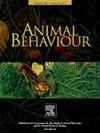两种果蝠(Chiroptera: Phyllostomidae)的性格和行为综合征
IF 2.3
2区 生物学
Q2 BEHAVIORAL SCIENCES
引用次数: 0
摘要
性格表明个体行为反应在不同时期的一致性,不同的性格特征可能与行为综合征相关。鉴于个体差异与其作为种子传播者的生态意义之间的潜在联系,对食果动物行为的这些方面进行调查至关重要。然而,很少有研究探讨果蝠是否存在个性特征和行为综合征。在这种情况下,我们的目的是测试新热带果蝠 Artibeus lituratus 和 Carollia perspicillata 是否表现出与活动、温顺和大胆有关的个体重复性(即个性),如果是,这些个性轴之间的相关性是否构成行为综合征。所有测试都在 48 小时后重复进行,以分析重复性。我们发现两个物种在攻击性、活动性和胆量方面的个体重复性都很高,但每个物种的行为综合征都不同。对于C. perspicillata来说,这三种行为是相关的,最温顺的个体更大胆、更活跃。对于 A. lituratus,温顺和大胆呈正相关,但活动与温顺或大胆无关。考虑到这些不同的综合征,我们的研究结果表明,与A. lituratus相比,C. perspicillata的行为特征变化可能较小,这可能是受到物种特有的选择压力的影响。虽然我们的研究结果仅限于雄性蝙蝠,但这些节食蝙蝠行为综合征的存在有助于我们理解个体行为差异对这些种子传播者生态功能的重要性。本文章由计算机程序翻译,如有差异,请以英文原文为准。
Personality and behavioural syndromes in two species of fruit bats (Chiroptera: Phyllostomidae)
Personality indicates consistency in individual behavioural responses across time, and different personality traits may be correlated in behavioural syndromes. Investigating such dimensions of the behaviour in frugivorous animals is crucial given the potential link between individual variation and their ecological significance as seed dispersers. However, few studies have explored the existence of personality traits and behavioural syndromes in fruit bats. In this context, we aimed to test whether the Neotropical fruit bats Artibeus lituratus and Carollia perspicillata show individual repeatability (i.e. personality) related to activity, docility and boldness and, if so, whether correlations between these personality axes constitute behavioural syndromes. All tests were repeated after 48 h to analyse repeatability. We found high individual repeatability in aggressiveness, activity and boldness for both species, but different behavioural syndromes for each species. For C. perspicillata, the three behaviours were correlated, with the least docile individuals being bolder and more active. For A. lituratus, docility and boldness were positively correlated but activity was not correlated with docility or boldness. Considering these different syndromes, our results suggest that C. perspicillata may show reduced variation in behavioural profiles compared to A. lituratus, likely influenced by species-specific selective pressures. Although our results are restricted to males, the existence of behavioural syndromes in these frugivorous bats contributes to our understanding of the importance of individual variation in behaviour on the ecological functions of these seed dispersers.
求助全文
通过发布文献求助,成功后即可免费获取论文全文。
去求助
来源期刊

Animal Behaviour
生物-动物学
CiteScore
4.60
自引率
8.00%
发文量
236
审稿时长
10.2 weeks
期刊介绍:
Growing interest in behavioural biology and the international reputation of Animal Behaviour prompted an expansion to monthly publication in 1989. Animal Behaviour continues to be the journal of choice for biologists, ethologists, psychologists, physiologists, and veterinarians with an interest in the subject.
 求助内容:
求助内容: 应助结果提醒方式:
应助结果提醒方式:


